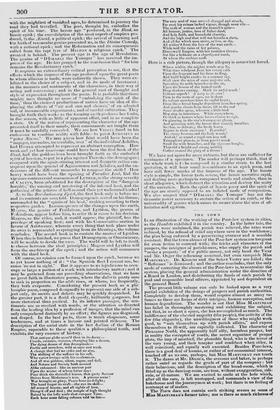THE TOWN
Is an illustration of the working of the Poor-law system in cities, as the Hamlets exhibited it in the country. In the latter tale, the paupers were reclaimed, the parish was relieved, the rates were reduced, by the refusal of relief anywhere save in the workhouse; the plan being enforced by a persevering overseer and a sensible assistant. But the town abuses of the Poor-law system are too great for even fiction to contend with; the tricks and clamours of the paupers, the intrigues of parishioners, who supply the parish and "make a property of the public money, not only bend the Vicar and Mr. Orger the reforming assistant, but even vanquish Miss MARTINEAU, Dr. Kinnear and the Select Vestry are tailed; the "Reformer" is dismissed ; and the author concludes, that the only mode of correcting the abuses of the Poor-laws is, to centralize the system, placing the general administration under the direction of a Board in London, and distributing the funds of each parish by paid and responsible local otlicers, appointed by and dependent on the general Board.
The present little volume can only be looked upon as a very partial exhibition of the doings of paupers and parish authorities. Completely to develop them, would require almost as many vo- lumes as there are forms of dirty intrigue, human corruption, and human degradation. The wonder is not that Miss MasertnEaut has failed in thoroughly mastering and exhibiting the subject, but that, in so short a space, she has accomplished so much. The indifference of the cheated majority (the people), the activity of the few (the oligarchy), the unwillingness of those who might work. good, to "mix themselves up with parish affairs," and expose
themselves to are capitally indicated. The character of Pleasance Nudd, the apparently- half silly, harmless pauper, but in reality the corrupter of youth, the secret organizer of pauper plots, the imp of mischief, the plausible fiend, who is the terror of the very young, and their tempter and confidant when older, is well conceived, and equally well executed. Besides Poor-laws, there is a good deal of human, or rather of not economical interest, touched off as no one, perhaps, but Miss MARTINEAU can touch it. The dance at Mr. Dixon's, the overseer and baker, is perhaps rather outrit as regards the grade of part of the company : but their behaviour, and the description of the bread-room, which is fitted up as the dancing-room, are true, without exaggeration, ridi- cule, or ill-nature. We are excited to smile at the hole which, after all the care, is left unstopped, and commands a view of the bakehouse and the journeymen at work; but there is no feeling of contempt or of malice. The Town does not contain such striking scenes as some of Miss Mawrtarsau's former tales; nor is there so much richness of


















 Previous page
Previous page